Services
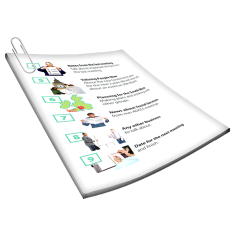
This information is about services that can support the mental health of people with intellectual disability.
It has information on
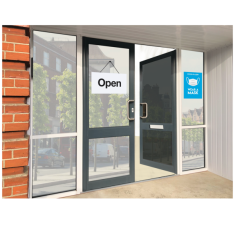
- Services that support mental health
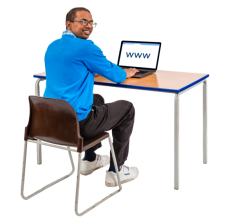
- How to start to find services near you

There is a lot of information.
Some words can be hard to understand.
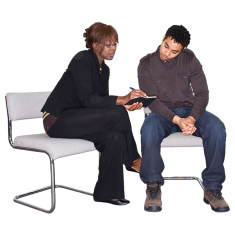
You can ask someone to read this information with you.
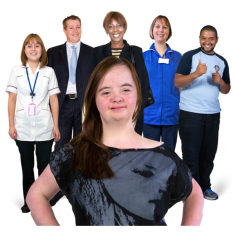
Public community mental health services are free services and programs that support people with mental health problems.

Mental health is about
- How you think
- How you feel
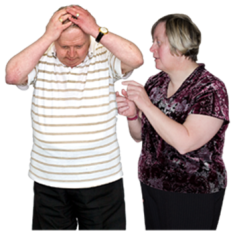
A mental health problem is when your feelings start to worry you.

Public community mental health services may be provided in a
- Clinic
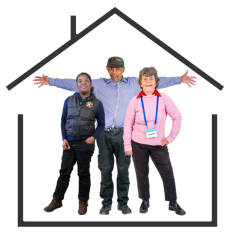
- A persons home

A range of different mental health workers work in community mental health services.
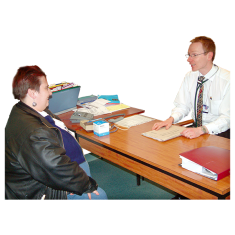
Mental health workers are people who work to help you with your mental health.
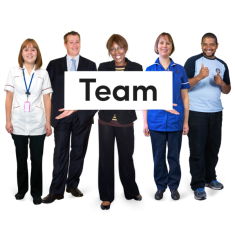
Some common public community mental health services are
- Acute care teams
Acute care teams see people with a mental illness who need help right away.

Mental illness is when your feelings and thoughts make it hard to do things

- Home care teams
Home care teams provide care to people in their homes.
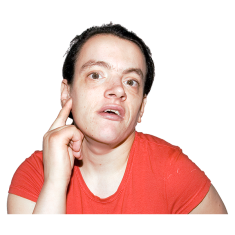
- Early psychosis teams
Psychosis is when people might find it hard to tell what is real.
Early psychosis teams provide care to people when they first find out they have psychosis.
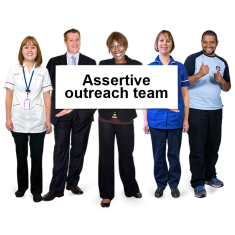
- Assertive outreach teams
Assertive outreach teams provide care and support to people with
- Serious mental illness
- Complex issues
Assertive outreach teams provide care co-ordination and advocacy.
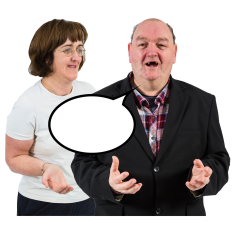
Advocacy is having your voice heard so your rights and needs are met.
You can have needs in many areas of your life.
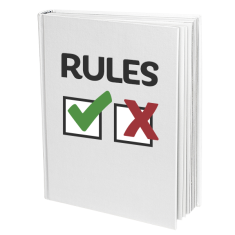
Rights are rules about how everybody should be treated fairly.
A right is something everyone has.

To find out more about community mental health services
- Ring the NSW Mental Health Line on 1800 011 511 any time on any day
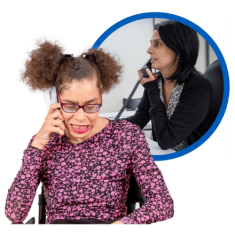
The mental health worker may
- Refer you to the local mental health team
or
- Give you information about other services that can help you
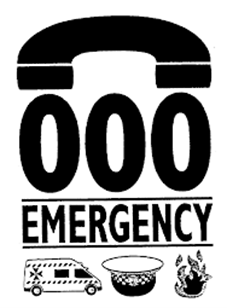
Crisis services are services that protect people who are at risk of harm.

If someone is in danger and needs help right away call 000.
For more information about who to contact in a crisis go to https://www.idmhconnect.health/
emergency-help/ER

An Emergency help card can keep you and others safe in a crisis.
A crisis is when you are in danger or are very upset.
You are in danger if you could be hurt or injured.
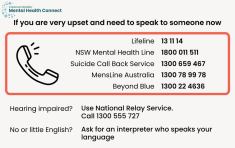
An Emergency help card can support you and others to
- Know what to do in a crisis
- Know who to contact in a crisis
- Call phone lines that can support you in a crisis

For more information about the Emergency help card go to https://idmhconnect.health/emergency-help-template/ER
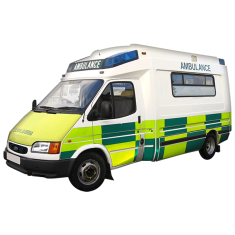
There are different crisis services including
- Ambulance or the police
Call 000 for an ambulance or the police.

- Emergency departments

- Acute care teams


To find out more about crisis services
If you need to communicate with a mental health worker you can ring the NSW Mental Health Line on 1800 011 511 any time on any day.
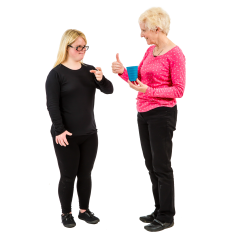
To communicate is how you understand and share your feelings or information.

The mental health worker may
- Refer you to the local mental health team
or
- Give you information about other services that can help you

Emergency departments
The emergency department is usually where you go if you have an urgent health problem.
This is important if you cannot get the help you need in the community.

You can go to the emergency department by ambulance.
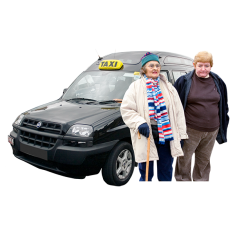
You can ask someone you trust to take you to the emergency department.
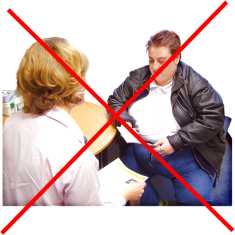
You do not need an appointment to go to an emergency department.
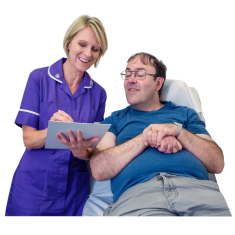
Doctors and nurses help people in the emergency department.
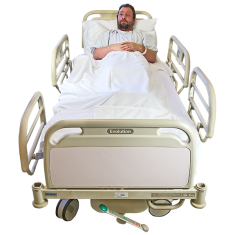
Inpatient units
An inpatient unit is part of a hospital.
Being an inpatient means you stay in hospital for one or more nights.
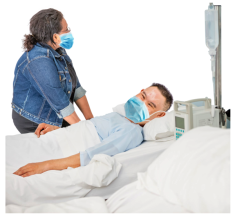
Inpatient units support people with mental illness who need more care than they can get in the community.

People usually enter an inpatient unit from an emergency department or community mental health service.

If you need to stay in hospital for your mental health you may be
- A voluntary patient
or
- An involuntary patient.
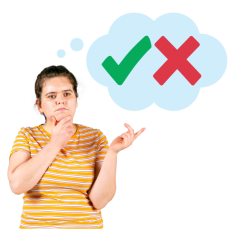
You are a voluntary patient if you decide to go to hospital for mental health treatment.

You or your guardian will have a choice in what treatment you have.
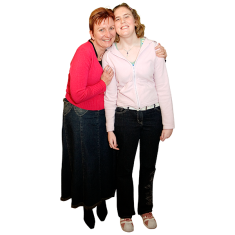
A guardian is a person who helps you make decisions about parts of your life when you cannot make decisions by yourself.
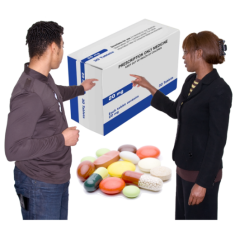
Treatments are things that can help you feel better.
Treatments can be therapies and medicines.
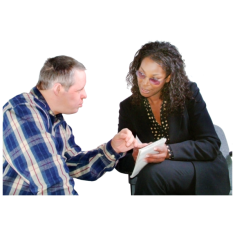
Therapies are activities your mental health workers use to support your mental health.

Medicine is sometimes called medication or drugs.
Medicine can be in
- A tablet
- A pill
- A drink
- An injection

For more information on voluntary patients go to https://www.3dn.unsw.edu.au/
sites/default/files/documents/
3DN_MHA_Voluntary_ERv1.pdf
For information about your rights as a voluntary patient go to https://www.3dn.unsw.edu.au/
sites/default/files/documents/
3DN_Rights_Voluntary_ERv1.pdf
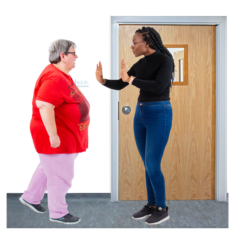
If you are an involuntary patient you must stay in hospital for mental health treatment until you are well enough to go home.
It is not your choice when you can leave.

You may be given a treatment you need even if you do not want it.

For more information about involuntary patients go to
https://www.3dn.unsw.edu.au/
sites/default/files/documents/
3DN_MHA_Involuntary_ERv1.pdf
For information about your rights as an involuntary patient go to https://www.3dn.unsw.edu.au/
sites/default/files/documents/
3DN_Rights_Involuntary_ERv1.pdf

For more Easy Read information about mental health and going to hospital go to https://www.3dn.unsw.edu.au/
consumers_information
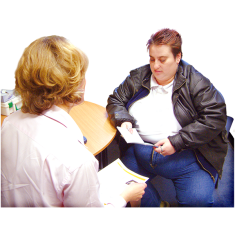
Outpatient clinics
An outpatient clinic is usually in or near a hospital.
You visit health workers at an outpatient clinic often after you have stayed in hospital.
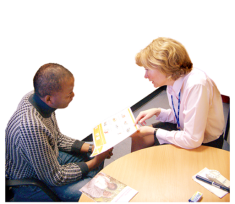
You are an outpatient if you visit a clinic or hospital for treatment but do not stay overnight.

Outpatient clinics provide different types of care.
For example a psychiatry clinic provides mental health treatment.

You can also find out more about outpatient care by communicating with your GP or mental health worker.
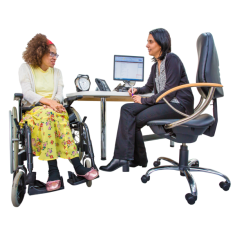
A GP is the doctor you see when
- You are sick
- You need a health check
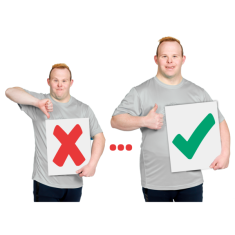
Rehabilitation
Rehabilitation services support peoples recovery.
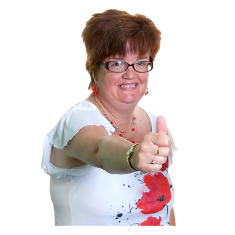
Recovery means getting better so you can do the things you want to do.

Rehabilitation services can be provided
- In hospitals
- Out of hospitals
You may stay in a rehabilitation hospital as an inpatient.
Or you may get support in an outpatient clinic.

The skills you need to live your life may have been affected if you had a mental illness.
Rehabilitation services help you to
- Keep your skills
- Get back your skills
- Improve your skills

Rehabilitation services provide care from multiple health workers.

For more information about rehabilitation services go to https://www.healthdirect.gov.au/
rehabilitation-after-illness-or-injury

To find a rehabilitation service

Specialist Intellectual Disability Health services help people with intellectual disability who have a mental illness.
Specialists are people who know a lot about intellectual disability.

Statewide Intellectual Disability Mental Health Hubs
There are two Statewide Intellectual Disability Mental Health Hubs that can help people with intellectual disability across NSW.
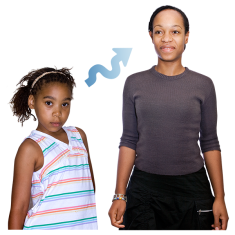
There is a Hub for adults and a Hub for children and young people.

You need a referral from your mental health worker to get support from the hubs.

A referral is when a doctor suggests you see a health worker who can help you.

The Statewide Intellectual Disability Mental Health Outreach Service
This service is for adults.

For more information about the Statewide Intellectual Disability Mental Health Outreach Service
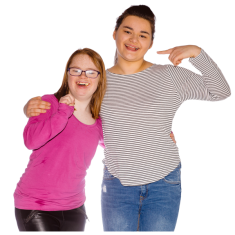
The Sydney Childrens Hospital Network Mental Health and Intellectual Disability Hub
This service is for children and young people under age 18.

For more information about the Sydney Childrens Hospital Network Mental Health and Intellectual Disability Hub

The Specialised Intellectual Disability Health Teams
The specialised health teams work in NSW.
They help people with intellectual disability and many health needs.

The teams work with your GP or other health workers to
- Give advice
- Make health care plans
- Suggest other services that could support you
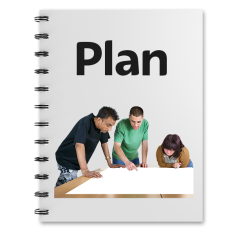
A care plan is a list of things you can do to help you get better.
A care plan is sometimes called a treatment plan.

There are 6 Specialised Intellectual Disability Health Teams.
These teams can also support people living in other parts of NSW.

Below are the contact details for the teams.
But you cannot get an appointment without a referral from your GP or health worker.

Hunter New England
People in the Central Coast Local Health District can also be seen by the team.
Email HNELHD-IntellectualDisabilityTeam@health.
nsw.gov.au
Call 02 4924 6067

Northern Sydney
Northern Sydney Intellectual Disability Health Team
This team sees adults and children.
People in the Mid North Coast and Northern NSW Local Health Districts can also be seen by the team.

For more information about the Northern Sydney Intellectual Disability Health Team go to
https://sydneynorthhealthnetwork
.org.au/wp-content/uploads/2019/09/
CDS_NSIDHT_Flyer_2018_A4.pdf
Email NSLHD-IntellectualDisability
@health.nsw.gov.au
Call 02 8968 3400

South Eastern Sydney
Specialised Intellectual Disability Health Team
This team does health assessments for people with intellectual disability who have many support needs.
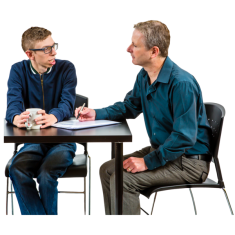
An assessment is when a mental health worker asks you questions about you and your health.
They use this information to work out the best way to help you.

For more information go to http://www.seslhd.health.nsw.gov.
au/services-clinics/directory/
child-youth-family-services/disability-
services
Email SESLHD-SpecialistIntellectualDisabilityHealth
[email protected]
Call 9113 4961 or 02 8566 1222

South Western Sydney
The Fairfield Specialist Disability Health Team
The team can help people with intellectual disability across all ages.
People in the Southern NSW Local Health District can be seen by the team.


Sydney Local Health District Team
The Specialist Team for Intellectual Disability
The team provides
- Health assessments
- Care plans
- Referrals to other services
People in the Western Sydney Local Health District can be seen by the team.


Western NSW
People in the Far West and Murrumbidgee Local Health Districts can be seen by the team.
Email [email protected]
Call 02 6369 8542

Complex Care Service
This service is run by the Centre for Disability Studies.
The service is for adults with intellectual disability who have many health needs.
It is for people who cannot get their health needs met by another service.

The service provides
- Assessments
- Health plans
- Advice
- Referrals
Referrals can be made by your GP or local Intellectual Disability Health Service team.

For more information
Email [email protected]
Phone 02 9036 3600 (Centre for Disability Studies Main Office)

3DN Clinic for the Assessment of Neuropsychiatric Disorders in Intellectual Disability
The clinic can help you when your doctors are not sure
- What type of mental illness you have
- How to best care for you

You need a referral from your specialist health worker to get support from the clinic.
The clinic sees people 18 years or older.
The clinic may see people aged 16 to 17 years after discussing with the team.

For more information
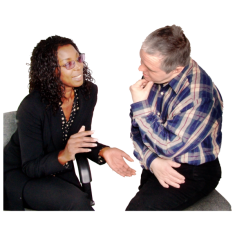
Private psychiatrists
A psychiatrist is a doctor who helps you with your mental health using talking and medicine.
Private psychiatrists are psychiatrists who work for themselves.
A small number of private psychiatrists are specialists in working with people with intellectual disability.

To find a psychiatrist go to https://www.yourhealthinmind.org/
find-a-psychiatrist
You can look for a psychiatrist who
- Knows a lot about intellectual disability
- Can speak your language
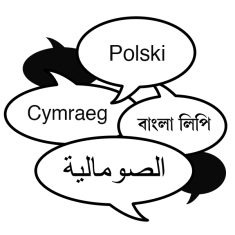
Language is a way of communicating that is used by a country or community.
Some examples of other languages are
- Vietnamese
- Arabic
- Cantonese
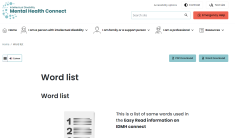
There are some tricky words on this Easy Read page.
For more information about these words go to